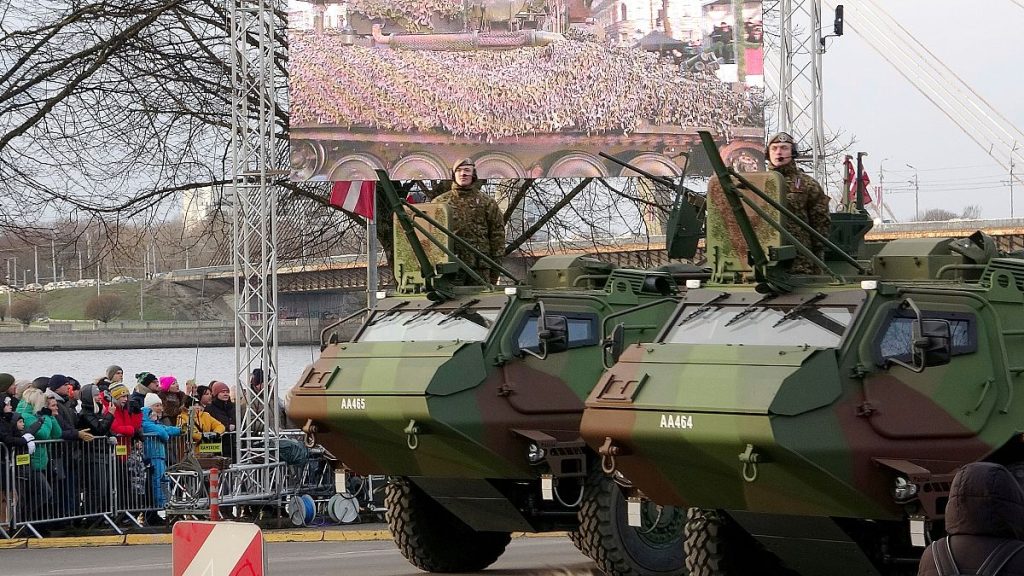Latvia is intensifying its defence measures in response to the threat of a Russian invasion, with security taking centre stage at the Riga Conference. The Baltic nation, with a population of nearly two million, shares a 300-kilometre border with Russia, making security and self-defence its top priority. Concerns over Russian aggression are prevalent at the Riga Conference, which focuses on foreign policy and security. Jānis Karlsbergs, chairman of the defence-focused NGO Latvian Transatlantic Organisation, highlighted Russia’s attempts to divide Latvian society and politicians, stating that this is the biggest danger. He emphasized that despite Russia’s weaknesses, it is important for Latvia to recognize its own strength and ability to defend itself. In response to the threat, Latvia reintroduced military service through a lottery system, aiming to train 4,000 soldiers by 2028 to counter any potential Russian invasion. Karlsbergs believes that this move will help integrate security-related issues within Latvian society, emphasizing that there is no distinction between society and the military – they are all part of the same family.
Nearly 1,000 days after Russia’s full-scale invasion of Ukraine, Latvia remains on high alert. The country is situated in a vulnerable position with its border adjacent to Russia, prompting the government to prioritize security and defence measures. The threat of Russian aggression is a central theme at this year’s Riga Conference, where experts and officials discuss foreign policy and security issues. Jānis Karlsbergs, an advocate for strengthening Latvia’s defences, pointed out Russia’s attempts to create divisions within Latvian society and politics. He stressed the importance of recognizing Latvia’s own strength and capacity to defend itself, despite Russia’s current weaknesses. The reintroduction of military service in Latvia, with a lottery determining who will serve, aims to train 4,000 soldiers by 2028 in preparation for a potential Russian invasion. Karlsbergs sees this as a way to naturally integrate security-related discussions into Latvian society, emphasizing the unity between civilians and the military as part of the same family.
The government’s decision to reintroduce military service in Latvia comes as a response to the heightened security concerns and potential threat of a Russian invasion. Through a lottery system, Latvian men ages 18 to 27 are selected to serve for 11 months, with the goal of training 4,000 soldiers by 2028. This initiative is seen as a crucial step in strengthening Latvia’s defences and preparing for any potential aggression from Russia. Jānis Karlsbergs, chairman of the Latvian Transatlantic Organisation, believes that integrating security-related discussions into society is essential for promoting unity and resilience against external threats. He emphasizes the interconnectedness between civilian society and the military, highlighting that they are part of the same family working towards a common goal of safeguarding Latvia’s security.
The Riga Conference serves as a platform for addressing foreign policy and security concerns, with a particular focus on the threat posed by Russia’s actions in the region. Nearly 1,000 days after Russia’s invasion of Ukraine, Latvia remains on high alert due to its proximity to the Russian border. Security and defence measures have become the country’s top priorities, with efforts to ensure preparedness in the face of potential aggression. Jānis Karlsbergs, a prominent figure in advocating for Latvia’s defences, warns of Russia’s attempts to sow division within Latvian society and politics. Despite Russia’s current weaknesses, Karlsbergs stresses the importance of recognizing Latvia’s strength and ability to resist external threats. The reintroduction of military service through a lottery system aims to train a new generation of soldiers to bolster Latvia’s defences and enhance societal resilience against potential threats.
The potential threat of a Russian invasion has prompted Latvia to ramp up its defence measures, with security at the forefront of discussions at the Riga Conference. As a country located on the border with Russia, Latvia faces heightened security concerns and the need to prioritize self-defence. Jānis Karlsbergs, chairman of the Latvian Transatlantic Organisation, speaks out against Russia’s attempts to divide Latvian society and politicians, highlighting the need for unity and strength in the face of external threats. Despite Russia’s perceived weaknesses, Latvia is taking proactive steps to enhance its defences and prepare for any potential invasion. The reintroduction of military service aims to train a new generation of soldiers and integrate security-related discussions into Latvian society, emphasizing the shared responsibility between civilians and the military in safeguarding the country’s security.
The decision to reintroduce military service in Latvia reflects the country’s commitment to strengthening its defences and preparing for potential threats, particularly from Russia. The lottery system, determining which young men will serve for 11 months, aims to train 4,000 soldiers by 2028 to counter any potential aggression. Jānis Karlsbergs, a key advocate for Latvia’s security measures, emphasizes the importance of integrating security-related discussions into society to promote unity and resilience. The Riga Conference serves as a platform for addressing foreign policy and security concerns, with a focus on the ongoing threat posed by Russia’s actions in the region. Despite the challenges and uncertainties, Latvia remains vigilant and proactive in safeguarding its borders and defending against any potential invasion. As the country continues to prioritize security and defence, efforts are being made to ensure preparedness and unity in the face of external threats.


